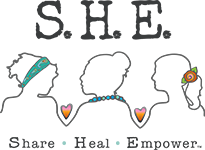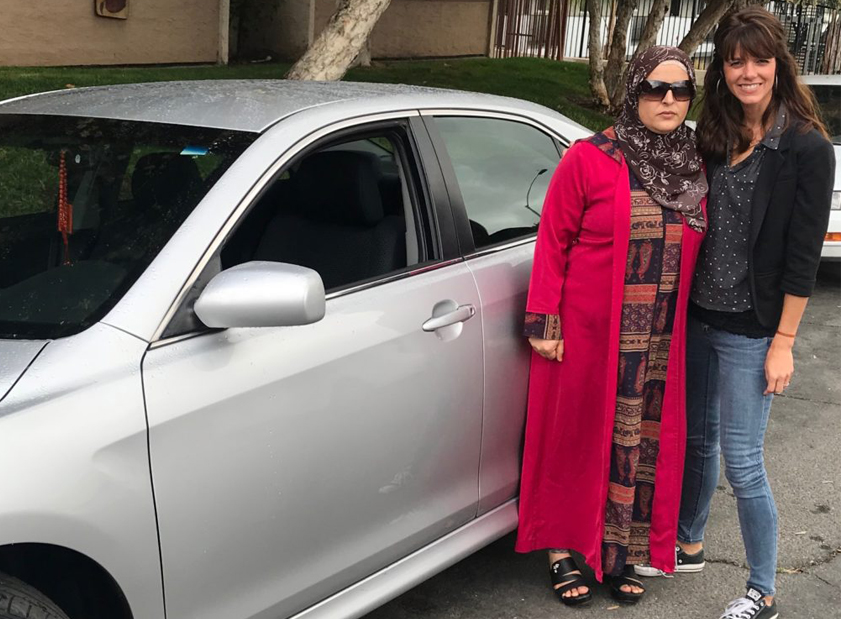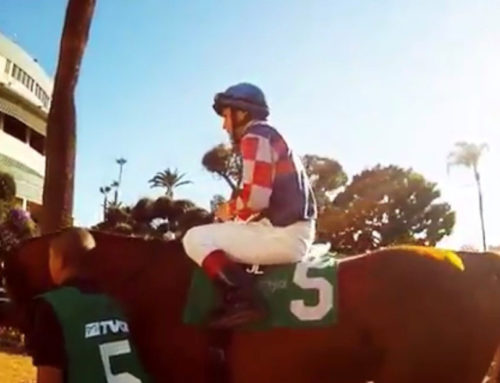When I arrived at Raouaa’s apartment in City Heights, a large neighborhood in San Diego known for its ethnic diversity, I was immediately greeted outside by her feisty and free-spirited little girl, Malak. The four-year-old was wearing pink sparkly sandals on the wrong feet, yet she managed to disappear quickly as her father, Nimr, continued to chase her around the apartment complex.
At the door I was welcomed by Raouaa who was holding six-month-old Jana. Surrounding their mother were Rukaia (age thirteen), Heba (eleven), Zamzam (nine), and Fatima (seven), all warmly waiting to welcome me. Two of their American sponsors, Terry and her husband Lee, also joined us for this afternoon visit.
The scent of lime and exotic spices filled the air as I took a seat on the low sofa covered with a traditional patterned kilim. The four blank walls of the perimeter had yet to be adorned. The older girls, Rukaia and Heba, served authentic Arabic coffee in delicate, demitasse cups. Caramelized Medjool dates and homemade flaky baklava were the answer to my sweet-tooth’s prayers. This tradition of warm hospitality is standard in their Arab culture.
With Rukaia and Heba helping to translate, Raouaa shared some of her story. The family came to America in 2016 after being forced to flee their home in Syria after the civil war began. They have been adjusting to a whole new way of life here in California. Raouaa has already learned to speak passable English, obtained her Green Card, and acquired a driver’s license. With help from the S.H.E. Foundation and other local donors, the family has also been able to purchase a car.
Raouaa’s smile was contagious when she decided to share it. I came away thinking about the importance of building community and connections. We all share similar hopes and dreams. I remember the newfound freedom and feeling of empowerment I felt when I learned to drive as a teenager. It makes me happy thinking of Raouaa experiencing those same feelings at the age of thirty-three. I’m so pleased that this generous wife and mother will have a chance to shine in our country.
***
During the bombing, I remember Fatima went for eight hours without food. She was a newborn baby, hungry and crying. I had to keep her quiet. I was afraid the Syrian army would find me and take me to prison with the other women. I don’t like to think about that or about what else might have happened. The idea of never seeing my husband and children again was more terrifying than the bullet buzzing past my ear.
Our whole street in Homs, the city where we lived, was completely destroyed in the bombing. Rubble was everywhere. We laid on our bellies in the desert dirt for many days to avoid being seen by the president’s army.
There had been many arrests made which sparked outrage and demonstrations throughout Syria. People were demanding the release of their children and family members. But the government, headed by President Bashar al-Assad, responded by killing and arresting hundreds of protestors. People were shocked and the anger spread. Some even demanded that President Assad resign.
We just wanted to live our lives in peace and freedom. The police took my husband’s mother and sister to jail for three days. They would have taken me too, but I hid. It saddens me when I think about all the different scenarios. Now I wonder if I will ever see our family and friends again.
It was April 25th, 2012 when we fled Syria. We lived in a refugee camp in Jordan for about four years. The conditions were bad, and it was very difficult to keep positive. There was little food, and we lived with eleven other families. Syrians were not allowed to work in Jordan so Nimr would go to Saudi Arabia to earn money. He was gone for months at a time working in construction. We did receive some assistance from the United Nations. It provided the short-term help we needed and we were thankful for it.
Humor has always helped me get through tough times. The kids sometimes think my jokes are funny, or if they don’t they still laugh anyways! I remember teasing my husband by reminding him that he fell in love with me before I fell in love with him. He was working at a tobacco shop when we started dating. We were engaged for two years and I was twenty when we got married.
I always try to do what is best for my family. I used to lie awake at night and dream about what our future might be. I wished for Nimr to get a good job. I wished for my son Louya, who is fourteen now, to also have a good job someday and to be able to afford a home of his own. I wished for all my children to get a good education. These dreams helped me keep going those difficult years we lived in Jordan.
After several years, the United States accepted our refugee status. In August 2016, we arrived in San Diego, California.
The International Rescue Committee helped us get to the United States and the Syrian Community Network provided us with sponsors and mentors. Terry, Lee, and Dr. Jenny Parker helped us understand all the things we needed to do to rebuild our life here in America. Each of them took time to get to know both me and Nimr, and they gave special attention to our children as well. They asked us about our interests and skills to help us find work. They also taught us about writing a resume, paying taxes, and establishing good credit history.
But the most important thing we really received from Terry, Lee and Dr. Jenny was their friendship. We went with them to museums, parks, the beach, and many other fun places. It helped us to feel like San Diego was our home.
It has been hard starting over here, and it is very lonely without our family. We are trying to integrate into another culture while maintaining our own traditions. It is important that my children know where they come from. As a mother, my desire is that my children be happy. I want them to have a good education and excel in school. I don’t want them to be afraid or be forced to leave their home ever again. All my children are happy here and making friends.
I miss so many things about Syria. We had a big house with five bedrooms. My kitchen back home was large and wish I was still cooking our meals there. Our extended family lived close and we could visit each other often. Nimr used to go see his parents every evening. Now, many of our family are still in Jordan, including Nimr’s parents. We have other relatives as far away as Canada and Australia.
When we were in Syria, my mother-in-law, who I call Aunt, taught me to cook Arabic food. Kabsa with spiced chicken and rice is one of my specialties. I was nervous when Dr. Jenny asked me to cater a lunch for sixty staff members and participants at the Hands of Peace program. But then I learned everyone had really enjoyed the different dishes I served. That made me feel happy and confident!
I have started taking culinary classes through the International Rescue Committee’s CHOP program. One day soon, I want to get my catering license. That is why I needed a car. It will make it easier for me to grocery shop, deliver meals, and take my children to school and appointments. My husband and I will take turns using it. Thanks to Lee, Nimr has found a job working in construction. Now he can also use the car at night to drive for Uber.
Some women in Syria cannot drive. For me, having this silver Toyota Camry is a dream come true! It makes me feel confident being able to drive a car. Nimr was nervous when I first got behind the wheel, telling me to slow down and stop when I did not need to. Dr. Jenny also practiced with me. She was very patient and I learned to drive in just five days. On the freeway I feel fearless, especially when I go a little fast!
I am very passionate about going to school and will love working. When I expand my catering business, I can bring my family a much-needed source of additional income. Sometimes I wish that I could drive back to Syria to prove that women can be drivers and business owners!



